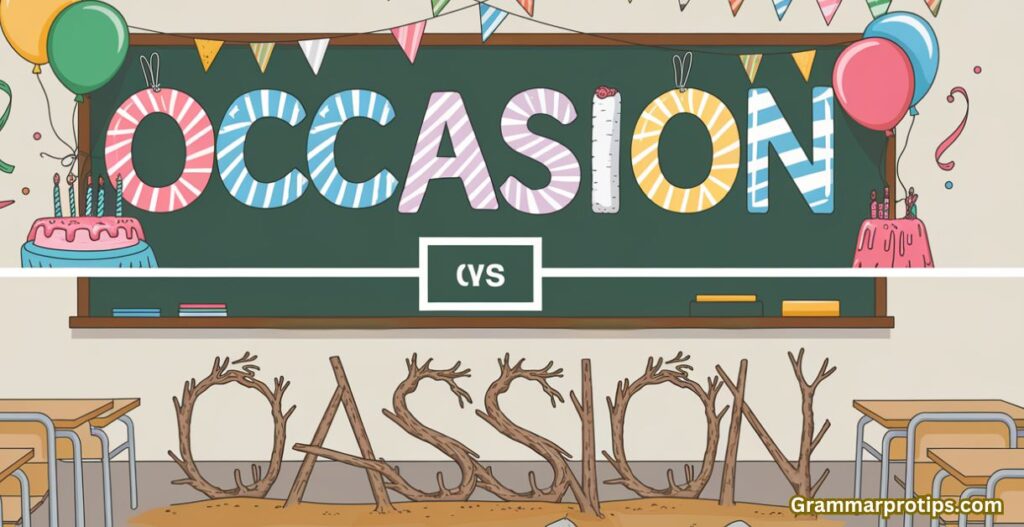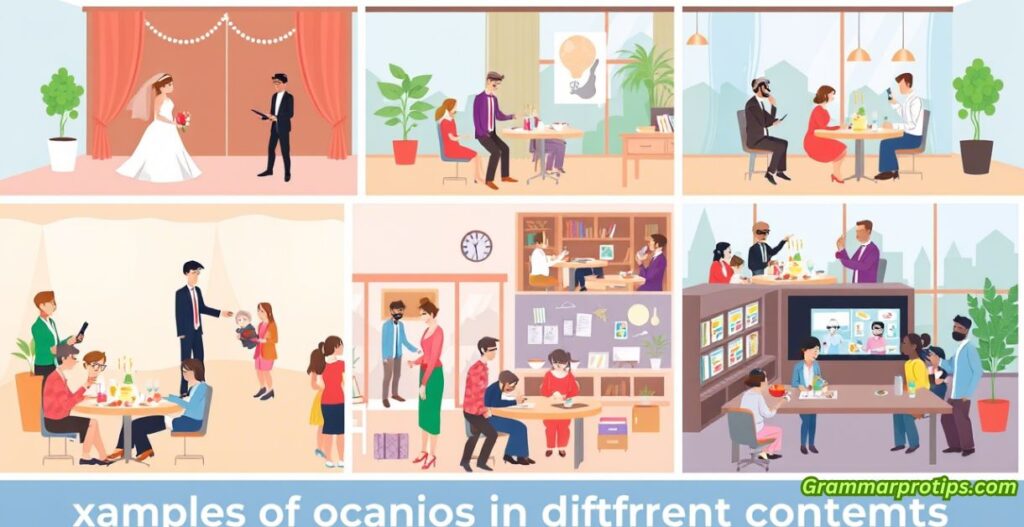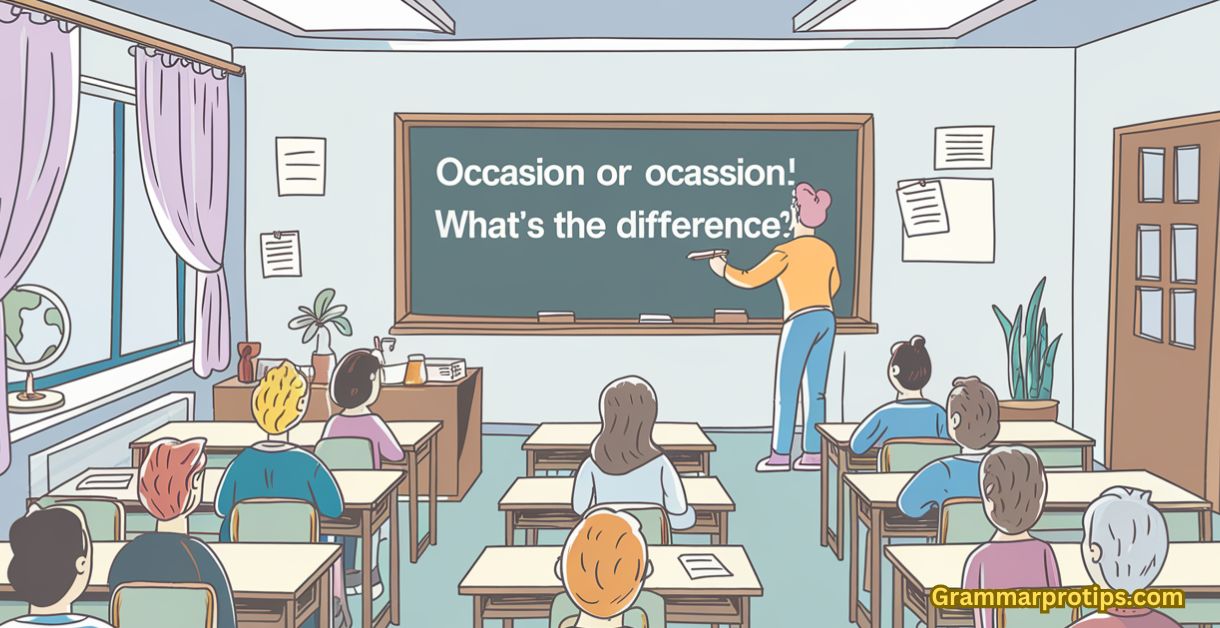When it comes to mastering the English language, even small details like spelling can make a big difference. One common stumbling block for writers is deciding between “occasion” and “ocassion.”
If you’ve ever paused mid-sentence to wonder, which one is correct, occasion or occassion, you’re not alone. Let’s dive into this topic with clarity, examples, and practical tips to help you avoid falling into the trap of typographical errors.
What is the Meaning of Occasion?
Before we tackle the spelling confusion, let’s break down what “occasion” actually means. An occasion refers to a specific time when something happens, often carrying significance or importance. It could be a special event, a celebration, or even just a casual moment that stands out from the ordinary.
For instance:
- A wedding anniversary is a milestone worth celebrating.
- A surprise birthday party is a significant occurrence in someone’s life.
The word “occasion” also has synonyms such as event, happening, or instance, depending on the context. Understanding its meaning will help us use it correctly in both formal and informal settings.
How Can I Use Occasion?
To answer the question, how can I use occasion, let’s explore some real-life scenarios where this word fits perfectly. Here are a few examples:
Scenario 1: Formal Invitation Email
Imagine you’re drafting an email to invite colleagues to a corporate event. You might write:
Subject: Join Us for a Special Celebration
Hi Team,
We’re excited to announce that next Friday marks a special occasion—our company’s 10th anniversary! This milestone deserves recognition, so please join us for dinner at Bella Vista Restaurant. RSVP by Wednesday.
Best regards,
Sarah
Notice how “occasion” adds a touch of elegance to the invitation without being overly complicated.
Scenario 2: Casual Conversation
In informal contexts, “occasion” works well too. For example:
“I don’t usually dress up, but last night was a rare occasion. My friend Alex got promoted, and we went out to celebrate!”
Here, the word conveys a sense of uniqueness and importance.
Which is Correct On Occasion or In Occasion?

Another frequent query revolves around prepositions paired with “occasion.” Many people mistakenly ask whether to say “on occasion” or “in occasion.” The correct phrase is on occasion, which means “sometimes” or “from time to time.”
For example:
- “On occasion, I treat myself to a fancy dessert.”
- “She visits her grandparents on occasion during the holidays.”
Using “in occasion” would be grammatically incorrect and sound unnatural. Keep this distinction in mind to maintain writing standards and avoid awkward phrasing.
What is the Full Meaning of Occasional?
The adjective form of “occasion,” called occasional, describes something that happens infrequently or irregularly. For instance:
- “He writes occasional articles for the local newspaper.”
- “We have occasional meetings to discuss project updates.”
Understanding the relationship between “occasion” and “occasional” helps clarify their usage in different contexts.
What is an Example of an Occasion?
Let’s look at some concrete examples of occasions to solidify our understanding. These include:
- Birthdays
- Weddings
- Graduations
- Holidays
- Promotions
Each of these moments qualifies as a special occasion, making them ideal opportunities to celebrate achievements or milestones.
Common Mistakes in Spelling: Misspelling of Occasion
One of the most prevalent typographical errors involves adding an extra “s” to “occasion,” resulting in “ocassion.” While it may seem minor, this mistake can undermine your credibility, especially in professional writing. Below is a table highlighting common misspellings and their corrections:
| Incorrect Spelling | Correct Spelling | Context Example |
|---|---|---|
| Ocassion | Occasion | “It was a joyous occasion.” |
| Occassional | Occasional | “She makes occasional appearances.” |
| Ocassions | Occasions | “There were many memorable occasions.” |
This simple oversight falls under the category of common mistakes in spelling, but with practice, you can eliminate it entirely.
Occasion vs. Ocassion Confusion: Why Does It Happen?

The root of the problem lies in pronunciation. Both “occasion” and “ocassion” sound identical when spoken aloud, leading writers to second-guess themselves. However, remember that the correct spelling is always occasion, no matter how it sounds.
Why Accuracy Matters
In professional settings, precision matters. Whether you’re crafting a business proposal, composing an email, or publishing content online, adhering to grammar and spelling tips ensures your message comes across clearly and professionally.
Synonyms of Occasion
Expanding your vocabulary can enhance your writing. Some useful synonyms for “occasion” include:
- Event
- Ceremony
- Gathering
- Festivity
- Commemoration
Using these alternatives strategically prevents repetition and keeps your prose engaging.
Writing Tips to Avoid Misspelling “Ocassion”
To steer clear of the dreaded misspelling of “ocassion,” follow these actionable tips:
- Proofread your work carefully before submitting or publishing.
- Use tools like spell checkers or grammar software (e.g., Grammarly) to catch errors.
- Memorize the correct spelling through repetition and practice.
- Read widely to expose yourself to proper usage in various contexts.
By incorporating these habits, you’ll elevate your professional writing skills significantly.
Examples of Occasions in Different Contexts

Let’s examine how “occasion” functions in diverse scenarios, ranging from formal announcements to casual chats.
Formal Announcement
Dear Mr. Thompson,
We are pleased to inform you that your hard work has been recognized. As part of our annual awards ceremony, we’d like to honor you for your outstanding contributions. Please mark your calendar for this special occasion.
Sincerely,
HR Department
Casual Chat
“Hey Jamie, do you remember that hilarious karaoke night? That was definitely an occasion to laugh about!”
These examples demonstrate the versatility of “occasion” across formal and informal contexts.
Event Terminology: Understanding the Nuances
While “occasion” is a broad term, it’s essential to distinguish it from related concepts like event, celebration, or gathering. Each carries subtle differences:
- Event: A planned activity or happening (e.g., a concert).
- Celebration: A joyful observance of a happy event (e.g., New Year’s Eve).
- Gathering: A group coming together for a shared purpose (e.g., a family reunion).
Knowing these distinctions enriches your ability to describe situations accurately.
Conclusion: Mastering the Correct Usage of Occasion
In summary, the debate over “occasion” versus “ocassion” boils down to accuracy and attention to detail. By focusing on the correct usage of occasion, avoiding typographical errors, and embracing writing tips, you can communicate effectively in any setting.
Whether you’re describing a special occasion, navigating event terminology, or simply striving to improve your professional writing, mastering this fundamental aspect of English will serve you well. So next time you sit down to write, take a moment to double-check your spelling—and let your words shine!
Key Takeaways
- Always spell “occasion” correctly; there’s no such thing as “ocassion.”
- Use “occasion” to refer to significant events, celebrations, or milestones.
- Remember that “on occasion” is the proper phrasing, not “in occasion.”
- Practice proofreading to minimize common mistakes in spelling.
With these insights, you’re ready to tackle any writing challenge confidently. Happy writing!

“Smith is the dedicated admin of [grammarprotips.com], a platform focused on enhancing grammar skills. With a passion for language and education, Smith strives to make grammar accessible and enjoyable for learners of all levels. Committed to delivering high-quality content, Smith continually explores innovative ways to help users master the complexities of grammar.”


I enjoy what you guys are usually up too.
This sort of clever work and exposure! Keep up the terrific works guys I’ve included you guys to
blogroll.
https://ww9.mbahtogel.top/